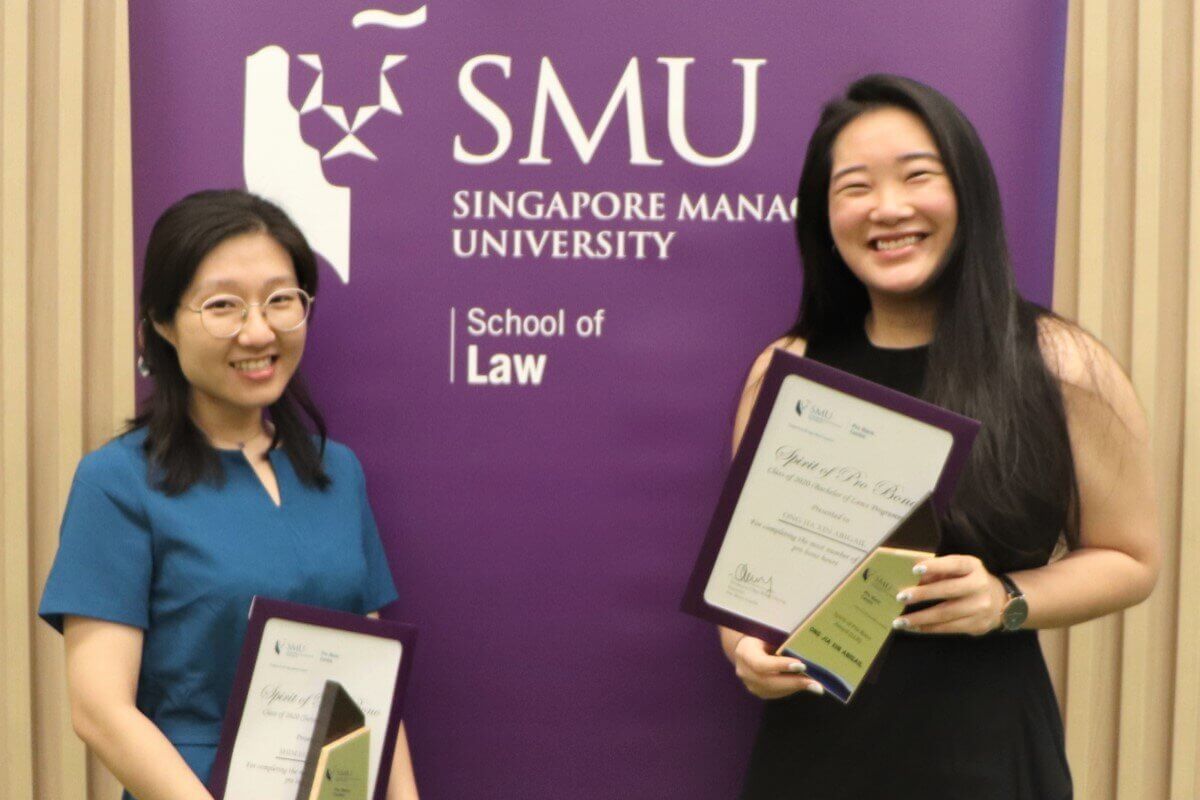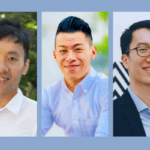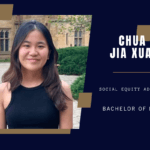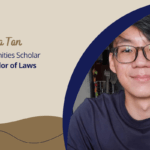[Feature image: (L-R) Ms Shim Eunkyung and Ms Ong Jia Xin Abigail]
By the SMU Social Media Team
The law is meant to serve everyone, and everyone should have access to legal representation in the justice system—that has always been a fundamental ethos of legal education in Singapore Management University.
To underline the importance of this ethos, all SMU law students are required to perform community service as a graduating requirement. Specifically, Juris Doctor (JD) postgraduate students and Legum Baccalaureus (LLB) undergraduates have to complete 50 hours and 80 hours respectively of approved pro bono work before they graduate.
Last year, the class of 2020 went above and beyond these requirements, achieving the highest average number of approved pro bono hours in the last four years. Topping their cohort in the amount of time spent on approved pro bono work was JD graduate Shim Eunkyung, and LLB graduate Ong Jia Xin Abigail, who contributed 424.5 hours and 138.8 hours respectively in approved pro bono work.
For their efforts, they each received the Winner of Spirit of Pro Bono Award from the SMU Pro Bono Centre. Here, they share more about what they learned from their pro bono work.
Spark for their fervour
“How do you know so much, but decide not to get involved?”
“We were always encouraged by our professors to participate in pro bono work, so we could experience for ourselves how meaningful our profession is in serving those in need,” says Abigail.
But her exposure to serving the community began much earlier. Her father, who works in the social service sector, would often share his experiences with beneficiaries such as at-risk youths. His passion and care made a deep impression on her.
“During my Year 1 and 2 in SMU, I volunteered at a weekly after-school kids programme at his youth centre, and I was so heartened while talking to one of the kids,” Abigail shares. “He told me how much he appreciated my dad striking up a conversation and checking in on him every time he came to the centre, as his family members were often too busy to simply ask him how he was doing.”
As she started doing pro bono legal work, Abigail brought her earlier experiences of community service to her new field, making sure to do her part to help the people seeking pro bono legal services feel welcome.
For Eunkyung, the catalyst for her pro bono fervour came from her interest in issues of social inequality. While taking a class on constitutional and administrative law, she noticed that the judgments in these cases had the potential to impact society on a different level.
“A question kept popping up in my mind and I had to confront it: How do you know so much, but decide not to get involved? I couldn’t answer that. So I decided it was time to get involved and give back to society,” she says.
Nature of their pro bono work
“If I don’t know the law well, it doesn’t make sense for me to provide low-quality service to someone who needs proper legal advice,”
Abigail volunteered for a variety of organisations, including the Legal Aid Bureau, Criminal Legal Aid Scheme, Pro Bono Singapore’s Community Legal Clinics and at the SMU Yong Pung How School of Law’s (YPHSOL) Pro Bono Clinic. Through the diverse spectrum of cases handled at these organisations, she was able to gain exposure to many different areas of law.
She appreciated the fact that law students were entrusted with responsibilities beyond administrative tasks. “For example, while in Legal Aid Bureau, I was tasked with researching property trusts, drafting legal documents for divorce applicants, assisting in interviewing applicants and creating a new database involving ancillary matters in divorce cases,” she shares.
Eunkyung also signed up for a variety of pro bono work, “most of them with the State Courts or various local legal clinics”, she says. “I enjoyed sitting in at the legal clinics because I would get to hear the cases and silently rack my brain on what claim might be possible.” She also served a Legal Fellowship stint at Justice Without Borders (JWB), where she assisted with substantive legal work for clients overseas who had previously worked as domestic workers in Singapore.
To realise their aspirations of doing more pro bono work, they had to make some strategic choices when it came to time management. “I saw the value in giving up a few hours of leisure or rest if it meant being able to contribute in even a small way to a person in need,” says Abigail, who tried to fit in pro bono work at SMU’s own pro bono clinic for a few hours in between classes during busier periods, and devoted more time to other centres during term breaks.
“I found myself feeling overwhelmed and worn out at times when juggling all my commitments,” she says candidly. “However, involving myself in pro bono was a constant reminder to stay grounded and remember my original intentions in wanting to study law in the first place.”
Eunkyung had a very disciplined and logical approach to planning her time allocation. “I have always prioritised schoolwork above pro bono work because I believe that I first need to be good at what I do. If I don’t know the law well, it doesn’t make sense for me to provide low-quality service to someone who needs proper legal advice,” she explains.
She thus scheduled her pro bono work to minimise clashes with her schoolwork, doing the bulk of it mainly after school semesters were over. “Also, once the circuit breaker was implemented due to Covid-19, I didn’t have to spend time travelling to school or the JWB office and that helped me save time.”
Life lessons
“I want to be the kind of lawyer that will truly treat a pro bono client the same way I would a paying client.”
For both, their pro bono experiences have given them a greater sense of empathy that will serve them well as they move forward in their legal careers.
The people who seek pro bono legal aid are often dealing with more than just the legal troubles on their plate, says Abigail. In one case where she had difficulty contacting an applicant to gather more information on her case, she was initially discouraged that the applicant seemed to be ignoring her phone calls. Only later did Abigail learn about the woman’s struggles as she related her situation juggling different job shifts and childcare responsibilities.
“Many times, what I thought I knew about them and their situation was nowhere close to the amount of pain and difficulty that they were actually going through, and this is something that has changed my attitude when dealing with not just beneficiaries but with anyone,” she reflects.

(L-R) Ms Shim Eunkyung and Ms Ong Jia Xin Abigail
Similarly, Eunkyung realised that part of becoming a good lawyer was about understanding nuances and sensitivities. Some of the former domestic workers she worked with at JWB had been through a tough time in Singapore, “and it was painful for them to have to relive their memories to tell us what they had experienced”, she remembers.
“Some of these clients decided not to pursue the matter even when they had pretty strong claims. It was a great learning experience for me watching the head of the JWB Singapore office carefully navigate each of these cases, and develop a sense of when to push a bit further, and when to pull back.”
Both agree that one of the most inspiring aspects of their pro bono work was the chance to work with people dedicated to helping those who needed it.
“Even though legal clinic sessions often ran late into the night, the volunteer lawyers and staff were always cheery and genuine in their interactions with each applicant. It impressed upon me greatly that they were doing it because they truly believed in bringing access to representation and legal awareness to everyone,” says Abigail.
For Eunkyung, pro bono work has made her think long and hard about the kind of person she wants to be. “This is something I have been mulling over for over a year and I think I have a tentative answer,” she shares. “I want to be the kind of lawyer that will truly treat a pro bono client the same way I would a paying client. I’m going to try very hard not to be condescending or patronising. I’m not going to preach to other people that they should do what I do. I’ve come to terms with the fact that my idealistic expectations about pro bono work are probably self-serving.”
It’s a nuanced response to the notion of altruism, which deserves more clear-eyed reflection in this “woke” age. Eunkyung cites Strangers Drowning: Grappling With Impossible Idealism, Drastic Choices, And The Overpowering Urge To Help, a book by journalist Larissa MacFarquhar, as one of the texts that she read as she grappled with the question of how to be good.
“The book included part of a speech by philosopher Ivan Illich, which I found helpful: ‘If you insist on working with the poor, if this is your vocation, then at least work among the poor who can tell you to go to hell… And it is profoundly damaging to yourselves when you define something that you want to do as ‘good,’ a ‘sacrifice’ and ‘help.’”
Inspired to take the next step with SMU? Find out more about the SMU Bachelor of Laws today!








